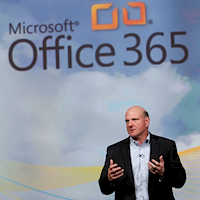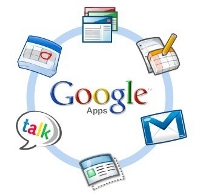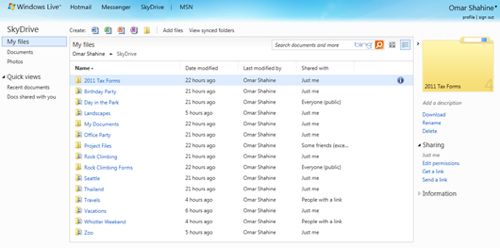
The Frugal Admin: Office 365 tempts me to give up Google Apps, and it will tempt you
There's no question that I like what I see in the demos of Office 365. A little research makes me want it even more. But I'm cheap, and so are a lot of the small businesses it supposedly targets. I think it can be competitive for small business and also end up selling a bunch of Windows phones. But can it compete with free?
Office 365 really does look better, richer, and cooler that Google Apps for Business, but it can be much more expensive. Many businesses will be willing to pay for the nice stuff, at least for a while, but most small businesses don't spend a lot more money than they need to on these things. I like to think of myself (and my domain which is both for my business and personal use) as one of those cheap small businesses.

IT demand for cloud services will generate $9.4B in new server sales
Spending on public and private clouds will generate $3.6 billion and $5.8 billion, respectively, in server spending by 2015, IDC forecasts. While there has been much written about public clouds, many IT organizations are setting up their own infrastructure to provide employees with access to their data anytime, anywhere and on anything.
No matter which cloud, many businesses today face huge security and privacy risks because of the volume of data taken outside on laptops, smartphones and other mobile devices. What's the point spending thousands, even millions of dollars, on network security, only to let crown jewels of information roam freely on mobile devices?

Is Google+ social done right?
It's the question I'm asking after watching the six videos embedded in this analysis and reading the blog post by Vic Gundotra, Google senior vice president of Engineering.
To be clear, I've read no other posts about Google+, not even the news story by colleague Tim Conneally (well, I did write the headline -- but that was all). That's typical of my writing. I prefer to have a fresh perspective, uninfluenced by others' opinions as much as possible. All observations I make here are solely my own.

Google responds to Office 365: Help us compile 365 reasons Apps is better
Yesterday in the cleverly titled "365 reasons to consider Google Apps" blog post, Shan Sinha, Google Apps product manager, gave just four why his company's cloud suite is better than Microsoft. Motivation: Today's global launch of Office 365.
I observed that four is a long way from 365. Apparently someone at Google was listening. Last night the GoogleAtWork Twitter account tweeted: "Help us to 365! Many asked for all 365 reasons to consider GoogleApps. Add yours here http://t.co/DTjLZZu or tweet #apps365". About three hours ago, Google issued the "Final call! Many asked for 365 reasons to consider GoogleApps".

Want to pay three times more than Google Apps? Office 365 is for you
When Microsoft's Office group formed in the early 1980s, something was missing from the DNA. Simplicity. Today's Office 365 plans -- seven of them -- are anything but simple. While Microsoft offers a stunning range of hosted apps capabilities, Office 365 pricing, or its feature set, is nowhere as straightforward as Google Apps. Nor as cheap.
Little more than two months after opening the public beta, Microsoft's hosted productivity apps service debuted today in 40 countries. Microsoft CEO Steve Ballmer announced Office 365 during a live New York event late this morning.

Uh-oh, Google Apps, Office 365 launches in 40 countries
Today, Microsoft made official its most important push into the cloud, ever, with release of Office 365. The software giant took off the beta moniker and released final pricing ahead of a New York launch event with CEO Steve Ballmer.
Office 365 combines Microsoft Office, SharePoint Online, Exchange Online, and Lync Online into a single cloud-based package that is scalable from small businesses to large enterprises, with a per-user license cost depending upon the volume of users. The new service is available immediately in 40 countries.

Why should Google wait for Microsoft to launch Office 365 tomorrow, when it can diss today?
Tomorrow morning, in New York City, Microsoft CEO Steve Ballmer will break out the band and play tribute to Office 365 -- the company's hosted app companion to its PC productivity suite. It's not rocket science understanding Microsoft's motivations, fending off competition from Google Apps among small businesses and enterprises and providing customers with what they really need -- anytime, anywhere access to their stuff on anything.
Google's cleverly titled "365 reasons to consider Google Apps" blog post gives anything but 365 reasons. If Google can't find 365, Microsoft should do so for its cloud suite launch. That would be great counter-marketing tactic.

Should I renew my Skype number?
While I was busy working and not paying attention to nag mail, my Skype number expired this week. I could reactivate and get another three months service for about 12 bucks after a 33-percent discount. But it's Whopper Wednesday. That $12 would feed the family, with enough change left over for some cool vanilla cones at the Rite Aid.
I've had a Skype number since April 2006 -- back when it cost just $38 a year. There's sentimental value having the number for so long, and it's the having not the number itself. The Skype # is not so memorable or well-known to be worth porting anywhere. My Skype is mostly used for calls I need to record, for reporting purposes. Oh, yeah, it buzzes the front gate to our apartment complex, too.

Microsoft presents attractive new SkyDrive after Dropbox security blunder
Microsoft this week is upgrading its free consumer cloud storage and collaboration service SkyDrive, making it faster, cleaner, and more competitive with services such as Amazon Cloud Drive, Apple iCloud, and Dropbox.
"While we have always focused on improving the performance of our websites, it was clear that we had reached a point where the kinds of performance gains we were hoping for would not come without an assessment of our entire experience from the ground up," Omar Shahine wrote in the Windows Live Blog yesterday. "SkyDrive has been around since 2007 and was simply not built for the modern web."

Spending on public IT cloud computing will more than triple by 2015
If your business isn't spending big on cloud computing perhaps it should, or will. Today, IDC forecast that public IT cloud spending would reach $72.9 billion in four years, up from $21.5 billion in 2010. That works out to 27.6 percent compound annual growth rate, which the analyst firm applied to five categories.
Those categories -- applications, application development and deployment, systems infrastructure software, basic storage and servers -- will account for nearly 50 percent in new net growth on IT spending, not just cloud computing, IDC claims. Software-as-a-service will account for about three quarters of public IT cloud spending.

Office 365 is live in eight days, if not sooner
Could Microsoft be less subtle? A press release issued today proclaims: "Microsoft Office Division to make announcement" -- "detailing the latest on Microsoft Office 365," which if you didn't know is the company's "next-generation cloud service." This is what companies do when there aren't enough rumors or buzz about a forthcoming product release. They desperately try to make some.
So to help Microsoft get that buzz lift, I'm taking a chance with a headline that definitely asserts Office 365 will be available next week. What else could it be? CEO Steve Ballmer is leading the launch event -- in New York City, where Microsoft does nearly all its big product launches.

Now anyone, not just cops with a warrant, can peek inside your Dropbox
Forensic computer security company ATC-NY on Thursday released a new, free tool called Dropbox Reader which helps investigators read "evidence files" associated with Dropbox cloud storage accounts.
Dropbox Reader is actually a series of six command line Python scripts which parse the configuration and cache files of a Dropbox account, including the user's registered e-mail address, dropbox identifier, software version info and list of recently changed files stored in config.db, the information about shared directories and files marked for sync stored in filecache.db.

92% of social network users are on Facebook, just 13% on Twitter
Today, Pew Internet released an 85-page report that is best described as a love letter to Facebook. The study smooches up to the social networking service in just about every conceivable way. Bottom line: Facebook has fundamentally changed where people spend time online and with whom they interact.
Pew surveyed 2,255 Americans 18 or older between Oct. 20 and Nov. 28, 2010. Among them: 1,787 were Internet users and 975 used social networking services.

What's this sudden uncertainty about Google Chromebook?
There has been a dramatic change in the Betanews poll asking readers if they would buy a Chrome OS laptop. The number for respondents answering "No" dropped significantly, while the yeses and maybes are way up. That's all just today. What does it mean?
The first Chromebooks went on sale today, from Acer and Samsung, ranging in price from $379.99 to $499.99. About seven hours ago, I posted the obligatory launch day story and included the buying-intention poll first posted six days ago. During the first days the poll was up, more than 85 percent of respondents said "No" to Chromebook. When I posted the earlier-day's story, the number was 69.4 percent, from 562 respondents. The number answering "Yes" was 11.57 percent, while 19.04 percent answered "Maybe."

How much does it cost to migrate a government agency to the cloud?
This week, the National Oceanic and Atmospheric Administration (NOAA) of the U.S. Department of Commerce announced it is migrating its 25,000 e-mail inboxes to a cloud-based solution which will integrate calendar, contact, and collaboration tools. The total cost of the migration will be $11.5 million for three-years, contracted to Earth Resource Technologies (ERT), a Maryland-based science and technology contractor who also works with NASA, USAID, and the Army Corps of Engineers.
"The cost to the taxpayer will be 50 percent less than an in-house solution," said NOAA Chief Information Officer Joseph Klimavicz. "As the new standard, cloud computing has great value allowing us to ramp up quickly, avoid redundancy and provide new services and capabilities to large groups of customers."
